Top 9 Free AI Courses To Launch Your AI Engineering Career
Are you ready to jump into the world of artificial intelligence? AI engineers in India are making over 20 lakh per year, and you can get started in 2025 with the right resources. Hello, I am Likhon Hussain, I am currently working as a Cloud Architect Engineer at Softifybd LTD.
In this blog post I’ve put together a list of the best 9 free artificial intelligence courses that will help you become an AI engineer. These courses are divided into beginner, intermediate, and advanced levels. I’ll also explain what you’ll learn in each course and why it’s important.
Is AI Engineering Right For You?
AI engineering is all about applying AI and machine learning to solve real-world problems. An AI engineer might spend their days building, testing, and deploying AI models. They also work on optimizing these models for performance and scalability. You should become an AI engineer if you’re excited about creating intelligent systems and making a difference with technology.
Essential Prerequisites for Aspiring AI Engineers
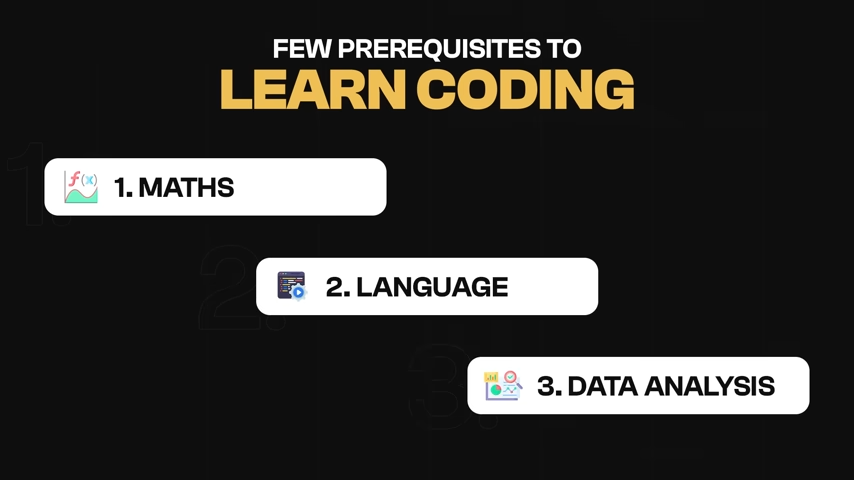
Before you dive into these AI courses, there are a few things you should know. Don’t worry, you don’t need to be a math whiz or a coding expert! These are just some basic skills that will help you along the way.
1. Mastering the Math Fundamentals
You don’t need to solve complex equations by hand, but understanding the basics of math is crucial. Focus on these key concepts:
- Matrix Multiplication: How matrices are multiplied together.
- Linear Algebra: The study of vector spaces and linear transformations.
- Calculus: Understanding integration, differentiation, and how to calculate the area under a curve.
These concepts are important because they form the foundation of many AI models. If you want to brush up on your math skills, check out this YouTube playlist that covers all the math you need to know for machine learning.
2. Python: Your Coding Companion
While you can use other languages like JavaScript, Python is the most popular language for building machine learning models. It’s easy to learn and has a ton of great libraries for AI development. Here are some essential Python concepts to learn:
- Basic Data Types
- Conditionals
- Functions
- For Loops
- Objects
- Classes
3. Data Analysis with Python: Unveiling Insights
Machine learning is all about using data to make predictions. That’s why it’s important to learn how to analyze data using Python. There are three essential libraries you need to know:
- NumPy: NumPy helps you organize data into arrays and lists. Think of it as a way to structure your data so you can work with it easily.
- Pandas: Pandas helps you organize data into tables and query it. This is super useful for exploring your data and finding patterns.
- Matplotlib: Matplotlib lets you visualize your data using charts and graphs. This is a great way to understand your data and communicate your findings to others.
Free AI Courses to Become AI Engineer in 2025
Now that you have the prerequisites, let’s get into the AI courses! I’ve divided these courses into three levels: beginner, intermediate, and advanced.
Beginner-Level AI Courses: Your Starting Point
These courses will give you a basic understanding of generative AI and how to use it.
1. Generative AI for Everyone (Coursera)
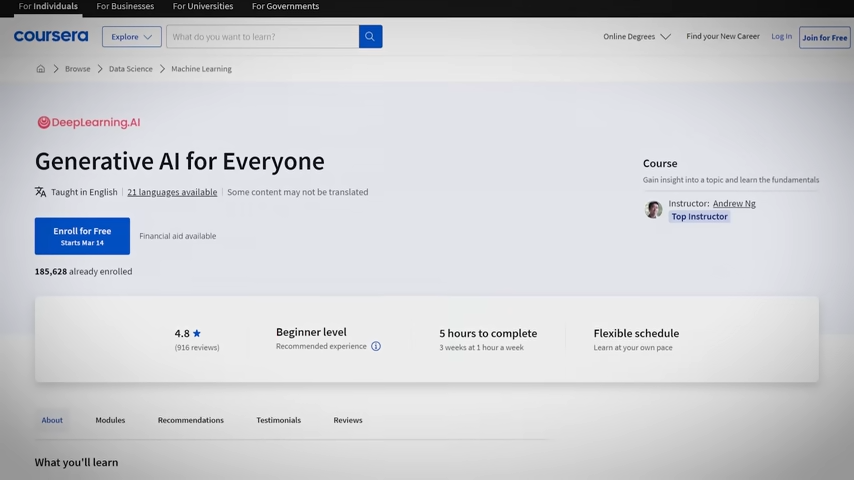
This course on Coursera will give you a basic idea of what generative AI is, how large language models work, and what you can do with generative AI in your own life. You’ll learn about the basics of building generative AI projects and how businesses and society can benefit from generative AI. The course also covers the limitations of AI. This 3-week course can be audited for free on Coursera.
2. Career Essentials in Generative AI by Microsoft & LinkedIn
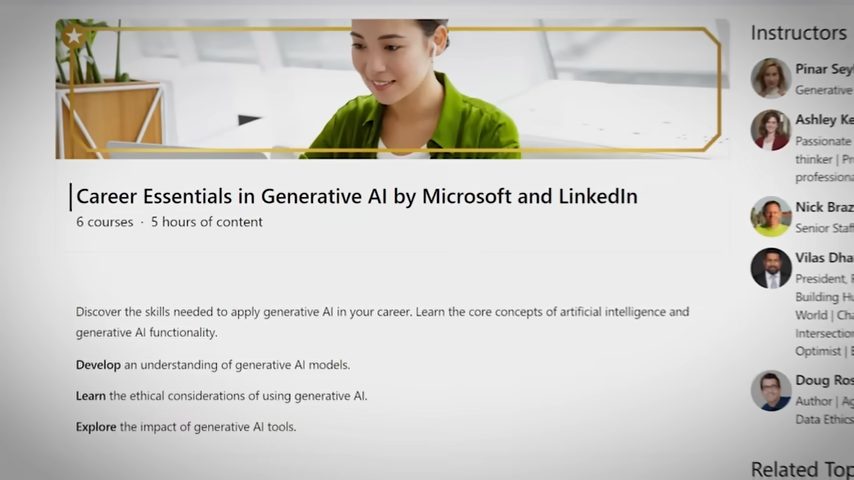
This course from Microsoft on LinkedIn focuses on how to use generative AI tools like Microsoft 365 Copilot to optimize your daily tasks. You’ll learn how to save time and use generative AI in your workflow. This 2-3 hour course is great for anyone who wants to improve their productivity.
3. ChatGPT Prompt Engineering for Developers (DeepLearning.AI)
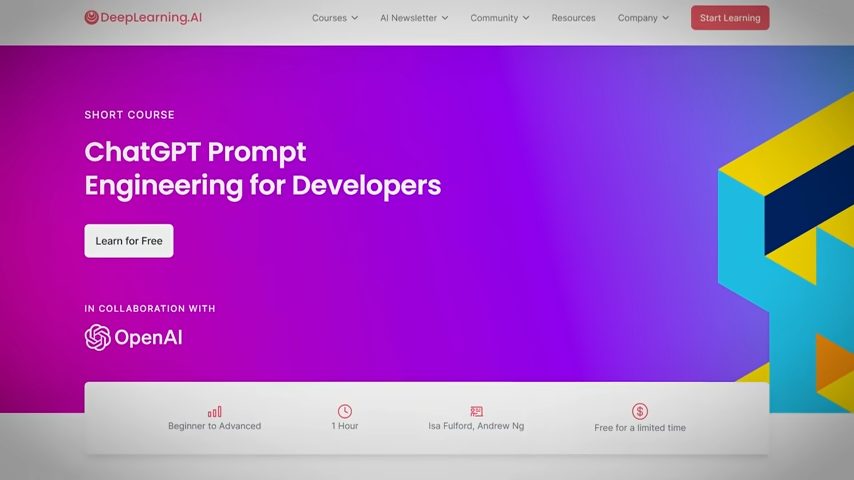
This course, taught by Andrew Ng on DeepLearning.AI, teaches you how to write effective prompts for ChatGPT. Everyone has access to ChatGPT, but what sets you apart is the quality of your prompts.
This short course shares tips and tricks for writing better prompts and getting better answers. If you’re looking for advice, feedback, or answers from ChatGPT, this course will teach you the right way to ask. You can find this course on the DeepLearning.AI website.
Intermediate-Level AI Courses: Diving Deeper
These courses will help you understand what’s happening behind the scenes of AI models.
4. Machine Learning by Stanford University (Coursera)
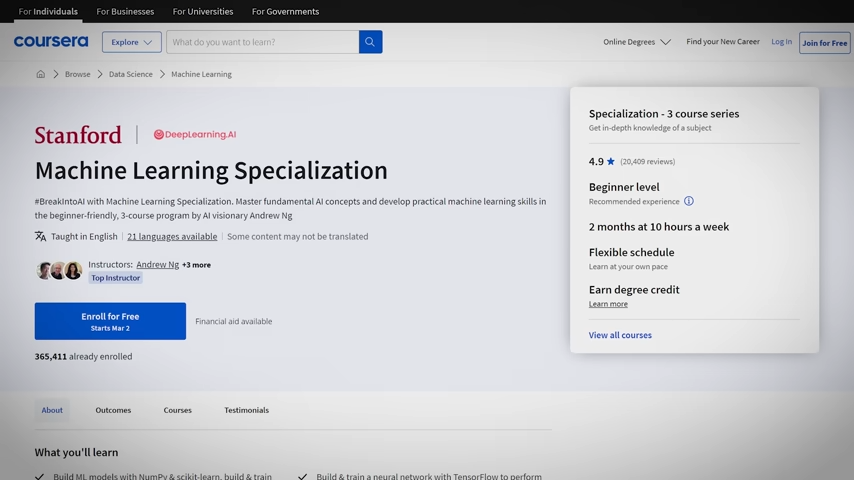
This course on Coursera, taught by Andrew Ng, provides an in-depth guide on how to build AI models from scratch. You’ll learn about supervised machine learning, unsupervised machine learning, and reinforcement learning.
You’ll also look at regression and classification problems. This course will give you a better understanding of what goes on inside of each of these models. You can audit this popular machine learning course for free on Coursera.
5. CS50’s Introduction to Artificial Intelligence with Python (Harvard OpenCourseWare)
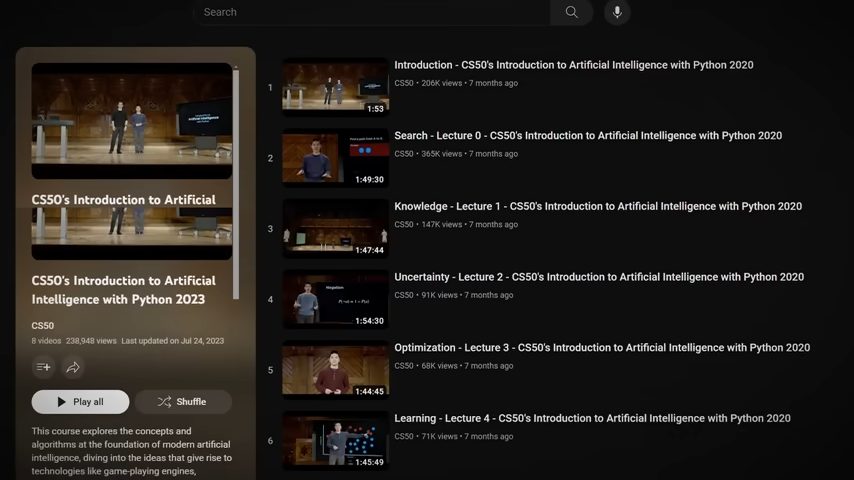
Harvard’s CS50 AI course is available to anyone around the world. This course goes into depth on concepts like neural networks, multi-layer perceptrons, and backpropagation. You’ll learn how to create algorithms and how models learn to detect patterns in machine learning. The course explains everything in simple terms, and it takes you from the basics of learning and uncertainty to how neural networks operate. Check out this CS50 AI course.
6. Introduction to Generative AI (Google Cloud Skills Boost)
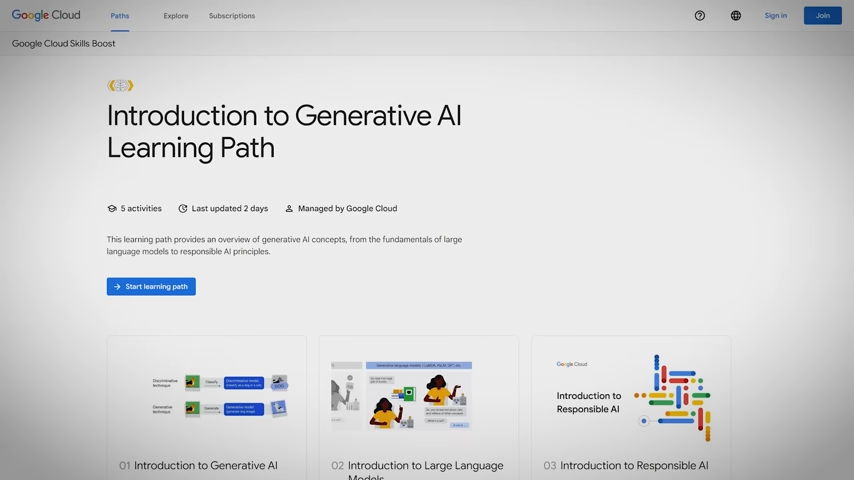
This Google learning path includes nine courses that teach you how to use Google’s suite of generative AI tools to build apps. You’ll learn how Transformers operate, what BERT models are, and how image generation happens with neural networks. This Google Learning Path is a great way to understand how to use AI in practice.
Advanced-Level AI Courses: Building Your Own AI Models
These courses will teach you how to build your own AI models.
7. Building Systems with the ChatGPT API (DeepLearning.AI)
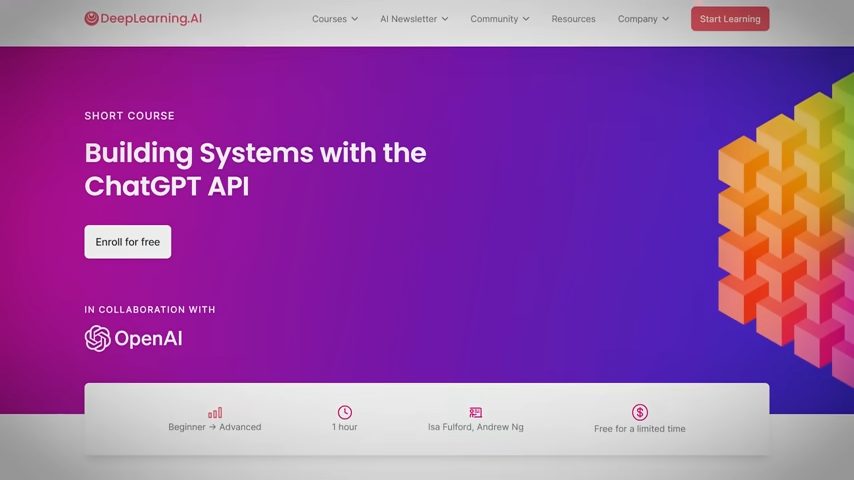
The easiest way to get started with AI is to use the OpenAI API for ChatGPT and plug it into your own app. Instead of building your own backend and database, you can simply use the API endpoint and get responses generated from ChatGPT.
This course teaches you how to build a simple app that relies on the ChatGPT API. You’ll understand the basics of the API and how to build apps with it. The instructor is from OpenAI, so you’ll learn the best practices for using the ChatGPT API. This course is available on DeepLearning.AI.
8. LangChain for LLM Application Development (DeepLearning.AI)
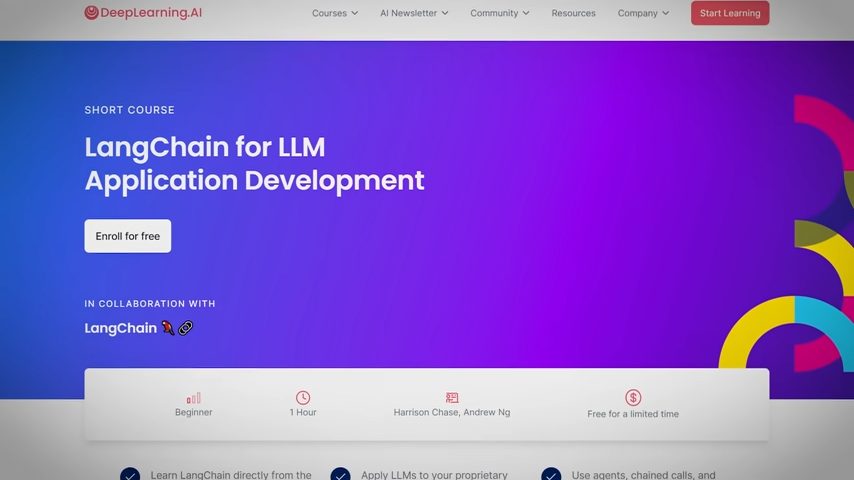
This course teaches you how to build real-world large language model (LLM) applications using LangChain. LangChain enables you to build generative applications very easily. You’ll learn how to use it to build generative AI applications quickly.
You’ll also be able to train LLMs on your own data and create custom chatbots that can only answer queries based on the data they’ve been fed. This course is a great way to get started with building generative apps. Check out this LangChain course on DeepLearning.AI.
9. Building Generative AI Applications with Gradio (DeepLearning.AI)
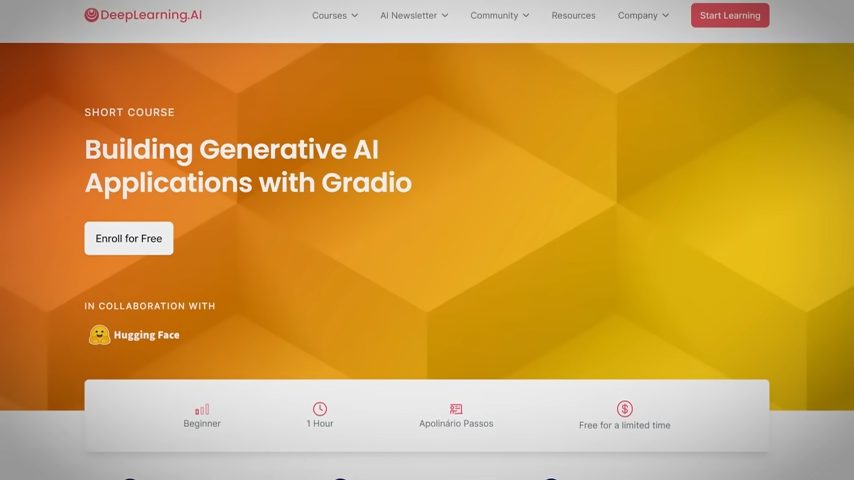
If you’ve learned Python, this course will make a lot of sense. Gradio works with Python repositories, allowing you to deploy and run any ML model you’ve created. You’ll be able to generate a simple generative AI app in just a few minutes with a few lines of code. This course is a great way to get started with building generative AI apps from scratch. You can find this course on DeepLearning.AI.
Share Your Journey and Connect
I hope these free artificial intelligence course with certificate help you on your journey to becoming an AI engineer. I’m excited to see what you build! I also have an in-depth AI roadmap that will give you a basic understanding of how to become an AI engineer. Thanks for reading, and good luck on your AI journey!


